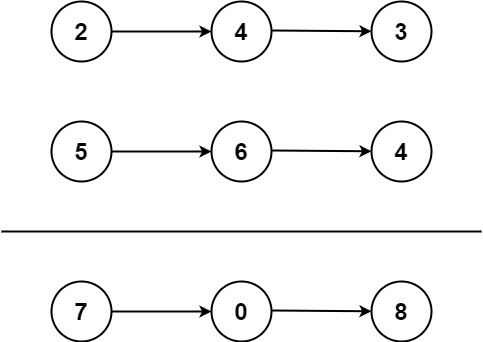136 lines
2.5 KiB
Markdown
136 lines
2.5 KiB
Markdown
# Leetcode Add-Two-Numbers
|
||
|
||
2022-09-08 15:22
|
||
|
||
> ##### Algorithms:
|
||
>
|
||
> #algorithm #math
|
||
>
|
||
> ##### Data structures:
|
||
>
|
||
> #DS #linked_list
|
||
>
|
||
> ##### Difficulty:
|
||
>
|
||
> #coding_problems #difficulty_medium
|
||
>
|
||
> ##### Additional tags:
|
||
>
|
||
> #leetcode
|
||
>
|
||
> ##### Revisions:
|
||
>
|
||
> N/A
|
||
|
||
##### Links:
|
||
|
||
- [Link to problem](https://leetcode.com/problems/add-two-numbers/)
|
||
|
||
***
|
||
|
||
### Problem
|
||
|
||
You are given two **non-empty** linked lists representing two non-negative integers. The digits are stored in **reverse order**, and each of their nodes contains a single digit. Add the two numbers and return the sum as a linked list.
|
||
|
||
You may assume the two numbers do not contain any leading zero, except the number 0 itself.
|
||
|
||
#### Examples
|
||
|
||
**Example 1:**
|
||
|
||

|
||
|
||
```
|
||
**Input:** l1 = [2,4,3], l2 = [5,6,4]
|
||
**Output:** [7,0,8]
|
||
**Explanation:** 342 + 465 = 807.
|
||
```
|
||
|
||
**Example 2:**
|
||
|
||
```
|
||
**Input:** l1 = [0], l2 = [0]
|
||
**Output:** [0]
|
||
```
|
||
|
||
**Example 3:**
|
||
|
||
```
|
||
**Input:** l1 = [9,9,9,9,9,9,9], l2 = [9,9,9,9]
|
||
**Output:** [8,9,9,9,0,0,0,1]
|
||
```
|
||
|
||
#### Constraints
|
||
|
||
- The number of nodes in each linked list is in the range `[1, 100]`.
|
||
- `0 <= Node.val <= 9`
|
||
- It is guaranteed that the list represents a number that does not have leading zeros.
|
||
|
||
### Thoughts
|
||
|
||
> [!summary]
|
||
> This is a elementary #math problem.
|
||
> For a list of similar questions, visit [[Elementary Math Problems]]
|
||
|
||
Done by using elementary math.
|
||
|
||
Use only one variable `tmp` to keep track of sum of 2
|
||
digits and carries.
|
||
|
||
### Solution
|
||
|
||
```cpp
|
||
/**
|
||
* Definition for singly-linked list.
|
||
* struct ListNode {
|
||
* int val;
|
||
* ListNode *next;
|
||
* ListNode() : val(0), next(nullptr) {}
|
||
* ListNode(int x) : val(x), next(nullptr) {}
|
||
* ListNode(int x, ListNode *next) : val(x), next(next) {}
|
||
* };
|
||
*/
|
||
class Solution {
|
||
ListNode *appendNumber(ListNode *ptr, int num) {
|
||
ListNode *ans = new ListNode(num, nullptr);
|
||
ptr->next = ans;
|
||
|
||
return ans;
|
||
}
|
||
|
||
public:
|
||
ListNode *addTwoNumbers(ListNode *l1, ListNode *l2) {
|
||
ListNode *ptr1 = l1, *ptr2 = l2;
|
||
|
||
// the minimum size is 1, so we can safely do this.
|
||
int tmp = ptr1->val + ptr2->val;
|
||
|
||
ListNode *ans = new ListNode(tmp % 10);
|
||
|
||
ListNode *tail = ans;
|
||
|
||
tmp /= 10;
|
||
ptr1 = ptr1->next;
|
||
ptr2 = ptr2->next;
|
||
|
||
while (ptr1 || ptr2 || tmp) {
|
||
if (ptr1) {
|
||
tmp += ptr1->val;
|
||
ptr1 = ptr1->next;
|
||
}
|
||
|
||
if (ptr2) {
|
||
tmp += ptr2->val;
|
||
ptr2 = ptr2->next;
|
||
}
|
||
|
||
tail = appendNumber(tail, tmp % 10);
|
||
|
||
tmp /= 10;
|
||
}
|
||
|
||
return ans;
|
||
}
|
||
};
|
||
```
|